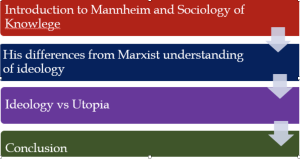Ques. What is Mannheim’s ‘sociology of knowledge’? Discuss how he differs from traditional Marxist understanding of ideology?
Answer

- Karl Mannheim’s “Sociology of Knowledge” broadened Karl Marx’s notion that the proletariat and bourgeoisie develop different belief systems and the idea of ideology as ‘false consciousness’.
- In Mannheim’s view, social conflict is caused by the diversity in thoughts and beliefs (ideologies) among major segments of society that are derived from differences in social location.
- Karl Mannheim in his famous work Ideology and Utopia rejects Marx’s theory of ideology on three grounds:
- ‘style of thought’ of any group is only indirectly related to its interests; there is no direct correlation between its consciousness and its economic interests;
- all thought is shaped by its social background; hence Marxism itself is the ideology of a class; and
- apart from classes, other social groups, like different generations, also have a significant influence upon consciousness.
- Mannheim considered that ideological knowledge is often placed within the given social structure and historical process hence such knowledge, including social scientists’, is situationally relative. The social structure to which ideas are bound are seen mainly in terms of class factors or status groups.
- The goal isn’t to identify the ultimate ‘truth’ of something, but instead to figure out in practice how people frame, perceive and interpret “the world out there.” Mannheim distinguishes between two sorts of “ideology”:

- Mannheim further contrasts ideology with utopia. Ideology represents the tendency of conservation, relying on false consciousness to muster support for the maintenance of status quo.
- On the other hand for Mannheim, a state of mind is utopian when:
- it is incongruous with the immediate situation and
- when passed onto actions, tend to shatter the order of things.
- It relies on false consciousness by projecting unrealizable principles to muster support for the forces of change. So, while ruling class makes use of ideology; the opposition may project a Utopia.
- This differentiation therefore was seen as Mannheim reflected in liberalism which may be seen as an ideology, while Marxism may be a form of utopianism



